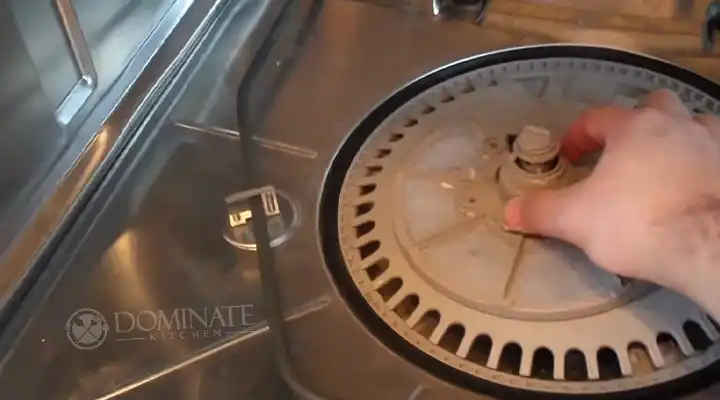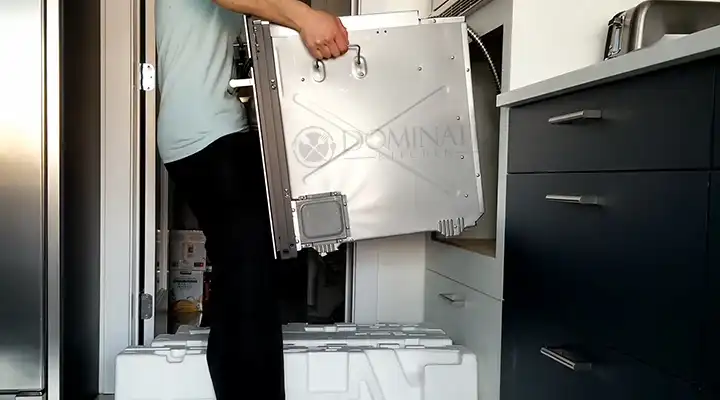How to Clean Old Kitchenaid Dishwasher Filter | Aiming for Peak Performance
Your dishwasher’s filter system plays a crucial role in ensuring your kitchen appliance can keep up with your culinary adventures. This dual-filter system, typically comprising an upper and lower filter assembly, acts as the first line of defense against food debris and foreign objects, preventing clogs and maintaining the integrity of your dishwasher. In this comprehensive guide, we will walk you through the why, when, and how of cleaning your dishwasher’s filter system.
Simply put, to remove and clean your KitchenAid dishwasher filter, start by accessing the filter system after removing the lower rack and cutlery basket. Then, gently remove the upper and lower filters. To clean, rinse, soak for stubborn residue, use a soft brush, and avoid abrasive tools. Optionally, use dish soap, but rinse thoroughly to prevent suds from causing drainage issues.

Removing the KitchenAid Dishwasher Filter
The process of removing the filter system may vary slightly depending on your KitchenAid dishwasher model. But overall, this is the process –
Step 1: Access the Filter System Start by removing the bottom dish rack and the cutlery basket to access the filter system.
Step 2: Remove the Upper Filter Assembly Locate the upper filter assembly, typically a circular filter with approximately a 4-inch diameter near the center of the tub. Gently turn the upper assembly a quarter turn counterclockwise and lift it out.
Step 3: Retrieve the Lower Filter The lower filter, often a flat, mesh, half-circle filter, can be found in the center of the tub. Grasp the lower filter in the circular opening, lift it slightly, and pull it forward to remove it.
How to Clean the Filters
Once you’ve successfully removed the filters, it’s time to clean them. Here’s how –
- Rinse the filters thoroughly under running water to remove loose debris.
- For tougher food particles, soak the filters in warm water for a few minutes to soften the residue.
- Use a soft brush or an old toothbrush to gently scrub away any remaining stubborn deposits, avoiding abrasive tools like wire brushes or scouring pads.
- Dish soap can be applied for additional cleaning but ensure thorough rinsing to prevent excessive suds that may cause drainage or leaking issues.
Why Does Cleaning the Kitchenaid Dishwasher Filter Matter?
At the heart of a clean and efficient dishwasher lies its filter system. The upper filter assembly safeguards your drainage system against debris, while the lower filter prevents food scraps from re-depositing on your freshly cleaned dishes. Maintaining these filters is vital to ensure your dishwasher operates at its best, consistently delivering spotless results.
When Should You Clean the Filters?
The frequency of filter maintenance depends on several factors, including your dishwasher’s usage and the quality of your home’s water. Here’s a general rule of thumb –
1-3 Loads per Week: Clean once a year if you wash before loading or scrape and rinse before loading. Clean twice a year if you only scrape before loading, and every two months if you don’t scrape or rinse.
4-7 Loads per Week: Clean once a year if you wash before loading or scrape and rinse before loading. Clean twice a year if you only scrape before loading, and every month if you don’t scrape or rinse.
8-12 Loads per Week: Clean once a year if you wash before loading, twice a year if you scrape and rinse, every three months if you only scrape, and every two weeks if you don’t scrape or rinse.
13-14 Loads per Week: Clean once a year if you wash before loading, twice a year if you scrape and rinse, every three months if you only scrape, and once a week if you don’t scrape or rinse.
Additionally, if you notice excessive debris on the upper filter assembly, dishes not being cleaned effectively, a gritty texture on your dishes, or drainage issues, it’s a clear sign that your filters require immediate attention.
Final Thought
Maintaining your dishwasher’s filter system is a simple yet vital task to ensure your appliance operates at peak performance. By understanding when to clean the filters and how to do it correctly, you can keep your dishes coming out fresh and ready for your next meal. A well-maintained filter system guarantees that your dishwasher works efficiently, preventing clogs, ensuring proper drainage, and leaving you with sparkling clean dishes after every wash. So, make filter maintenance a regular part of your dishwasher care routine and enjoy the best possible results from your kitchen companion.


![KitchenAid Bowl Won’t Unlock [7 Methods to Unlock]](https://www.dominatekitchen.com/wp-content/uploads/2023/11/KitchenAid-Bowl-Wont-Unlock.webp)




